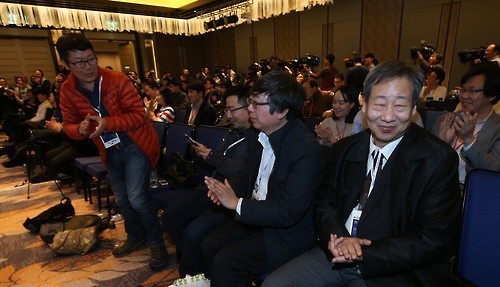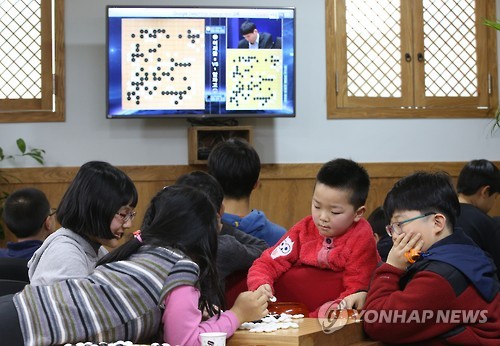- California Assembly OKs highest minimum wage in nation
- S. Korea unveils first graphic cigarette warnings
- US joins with South Korea, Japan in bid to deter North Korea
- LPGA golfer Chun In-gee finally back in action
- S. Korea won’t be top seed in final World Cup qualification round
- US men’s soccer misses 2nd straight Olympics
- US back on track in qualifying with 4-0 win over Guatemala
- High-intensity workout injuries spawn cottage industry
- CDC expands range of Zika mosquitoes into parts of Northeast
- Who knew? ‘The Walking Dead’ is helping families connect
S. Koreans erupt in joy over Lee’s first win against AlphaGo
SEOUL (Yonhap) — South Koreans were ecstatic Sunday as Go player Lee Se-dol won his first victory against Google’s artificial intelligence program AlphaGo, a dramatic win after three consecutive defeats last week.
Lee collected his first win against AlphaGo earlier in the day after playing nearly 4 hours and 44 minutes. The score at the man-versus-computer Go tournament called Google DeepMind Challenge Match is now 3-1.
South Koreans everywhere could not contain their joy as they watched as AlphaGo, built by Google’s London-based firm DeepMind, surrendered the match after 180 moves.
Kim Yong-seop, an amateur fourth-dan who teaches at Chonbuk National University Law School, said he felt helpless when Lee was defeated by Google’s self-learning program three straight times, but now he is happy as the victory seems to confirm humankind’s unlimited possibilities.
“I would like to convey to Lee that he fought well against the machine,” Chang Byung-hoon, a 53-year-old fan of Go, said while tears pricked his eyes as he was overwhelmed by emotion over Lee’s victory.
Kang Gun-nuel, a 39-year-old fan of Go, said it was a thrilling victory for Lee who put in his utmost efforts. The fan said he hoped that Lee will win against AlphaGo in their final and fifth match to “prove that humans still hold an edge over a machine.”
Lee is set to face off against AlphaGo in their final showdown on Tuesday at a hotel in central Seoul.
Kim Jin-seop, 28, said he heaved a sigh of relief when Lee won against AlphaGo.
“I am proud” of Lee as a South Korean, Kim said as he watched the match at his home.
Professional Go players said they were also thrilled at Lee’s first victory against AlphaGo.
Lee “is really great,” Yang Jae-ho, a ninth-dan player who serves as secretary general of the Korea Baduk Association. Go is known as “baduk” in Korea.
In China, the world’s top ranked Go player Ke Jie, 18, said he is “happy to see Lee win finally,” according to China’s state-run Xinhua news agency. He also said AlphaGo has its weakness and claimed that the program can’t beat him.
South Koreans were basking in the euphoria over Lee’s victory, though some experts cautioned that Lee could face an uphill battle against AlphaGo when they confront each other for their final showdown.
“AlphaGo has more chances to win in the fifth match in terms of probability,” said Choi Dae-sun, a professor who researches artificial intelligence called deep learning at Kongju National University in the country’s western area.
Choi pointed out that AlphaGo won three straight matches against South Korea’s Go champion because it intentionally placed each stone with the aim of securing the highest probability to take the game. He said the machine’s ability to lay stones with the aim of winning is better than if the game is played by a human.















![배우 김민희와 홍상수 감독[스타뉴스]](http://www.koreatimesus.com/wp-content/uploads/2025/04/20250408101705671-120x134.jpg)

